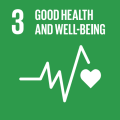After graduating from a nursing school in Buea in 2017, a great part of my work was done in the suburbs, where I found there were significant limitations in social amenities, including inaccessibility to healthcare. There were times where we went for months without potable drinking water and were left with no other option but to use water from streams which were also used for waste disposal, thereby exposing the population to infectious diseases like cholera, typhoid fever, and skin infections.
In order to contribute substantially towards improving healthcare in such settings, nurses were expected to work hard and attend health-related training workshops and refresher courses. Also, I gained critical creative thinking and practical skills which enabled me to handle highly pressurised situations in a professional manner. With a great passion to help support patients and vulnerable members of society, the quest for knowledge motivated me to further my career in nursing.
Health education plays a key role in the prevention of both communicable and non-communicable diseases. As part of community health practice within an area of the Southwest region called Bota, I carried out health sensitisations within the communities specifically on water-borne diseases and diseases of high prevalence in Sub Saharan Africa such as malaria, HIV and TB. I also organised and participated in health seminars and in the regulation of nursing practice in Cameroon through my membership with the Cameroon Nurses Association, which is affiliated to the Commonwealth Nurses Federation. In this light, I offered voluntary services to train Higher National Diploma nursing students in the Medical and Biomedical field, both in theory and practical skills at a nursing institution in Douala. I educated second-year nursing students, evaluated and trained them on patient care and how to carry out evidence-based research within the specialised area of medical pathology. I equally ensured adherence to the standards and guidelines of the nursing practice.
Supporting communities
The connections and relationships I have built have spurred my professional and personal growth to date. During one of my internship programmes in an underprivileged community, I created and coordinated a family planning club for women and young girls in remote areas who could not access healthcare. This club offered basic healthcare, antenatal care, and infant welfare clinic to improve maternal and child health. My team, comprising 50 committed members, met the main objectives, proving it a success. For me, working with young people has been the most challenging experience but it has strengthened me to incorporate and manage different temperaments. One such difficult experience was the HIV project which I coordinated in one of the most populated schools in the Littoral Region. This project aimed to inform adolescents on the transmission of HIV, provide free screening, and distribute contraception. This program was centered on preventing HIV infection through a complementary contribution of behavioral, biomedical, and structural strategies and met the needs of high-risk groups.
Humanitarian crisis
The ongoing Southern Cameroon conflict has led to a humanitarian crisis. Inhabitants from the English-speaking regions (Northwest and Southwest) have fled to neighboring towns for security purposes. So far, over 4,000 people, including members of the military, have died and several others have been seriously injured with no access medical care. The French-speaking regions are presently burdened by displaced people who are in urgent need of humanitarian assistance. Furthermore, the Boko Haram Terrorist Group conflict has expanded into the Far North region of Cameroon and resulted in the death of a significant number of citizens. This region also hosts thousands of refugees from Chad and the Niger. The conflicts have resulted in overcrowded refugee camps with unfavorable conditions resulting in frequent cholera outbreaks.
The ongoing Covid-19 pandemic and many other health challenges have further complicated healthcare delivery in Cameroon with a weak healthcare system and infrastructure. Humanitarian interventions are therefore much needed to mitigate and manage these challenges as well as assist the affected communities to recover from such crises. If these crises continue to affect Cameroon, there is a need to put an Emergency Response Plan in place as indicated in Sustainable Development Goal 3d.1 (international health regulation capacity and health emergency preparedness).

Acha Anwi Therese providing antenatal and health sensitisation to pregnant women in a hospital in Bota, Limbe
The next stage
Upon returning to my country, I plan to work with the Ministry of Public Health (MoH) to strengthen the Cameroon Emergency Response System to promote the stability of affected regions. I equally plan to work with aid agencies to manage the refugees in Northern Cameroon to provide humanitarian assistance to the victims of the ongoing Southern Cameroon conflict who are stranded. With humanitarian health training, received from the Liverpool School of Tropical Medicine, I aspire to become a health professional pioneer who has specific knowledge and skills in providing holistic humanitarian assistance which will enable me to mentor other healthcare workers. I intend to set up a team that will organise programmes to train support groups in the effective management of humanitarian emergencies in the Northern and the English-speaking regions of Cameroon.
I equally intend to support the MoH to deliver essential health services, especially to the remote communities through health outreach campaigns. In the future, I hope to work with the government to influence policies which will create an environment for aid workers to operate and develop customised public health emergency response systems to improve the government’s preparedness in the event of crises and disasters in Cameroon and strengthen the Cameroon Emergency Response System. It is my vision to contribute to the training of professionals in the humanitarian health field, and carry out extensive research to evaluate evidence-based methods to improve public health interventions during cholera outbreaks in various localities and refugee camps in the Northern region of Cameroon.


![Therese_Anwi_Headshot[1] Headshot of Acha Anwi Therese](https://cscuk.fcdo.gov.uk/wp-content/uploads/2021/02/Therese_Anwi_Headshot1.jpg)
